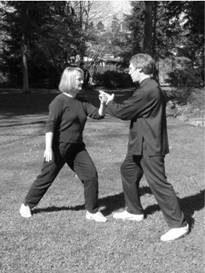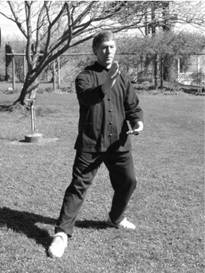 Gilman Studio On-Line Lessons
Gilman Studio On-Line Lessons
Yang Style Tai Chi Special 34 Movement Short Form
This Lesson Contains:
Movement # 4 – Roll Back (Lu Jin)
The second of the eight energies of Tai Chi Chuan is known as Lu or Roll Back. Yin follows Yang. After expansion (Peng) we will naturally want to come back to center (Lu). This movement requires the special skills acquired during Tai Chi practice: that of joining and sticking, and leading. The opponent strikes forward with her left hand. I join, stick, and lead her into emptiness toward my left side.

 Starting at the previous movement, there is a transition into this movement. In the form, the right hand makes a slight circle from palm facing inward to palm facing to the left. There is also a slight lengthening to the right arm. The left palm rotates slightly from palm facing forward and slightly down to fingers facing forward. The body is starting to retreat. As the weight shifts back, the waist starts to turn. Be sure to keep the elbows drooping.
Starting at the previous movement, there is a transition into this movement. In the form, the right hand makes a slight circle from palm facing inward to palm facing to the left. There is also a slight lengthening to the right arm. The left palm rotates slightly from palm facing forward and slightly down to fingers facing forward. The body is starting to retreat. As the weight shifts back, the waist starts to turn. Be sure to keep the elbows drooping.
This is the moment of joining. I do this with the back of my left wrist. I make no attempt to grab her at this point. I join and stick to her wrist area. I must be very soft when I do this so partner does not feel threatened and try to pull away. Softness also allows me to listen (Ting) to what she is really doing with her energy. I am going to follow her force and direction, and lead her into a place she doesn’t really want to end up.
At this point my focus is in the back of my left hand and wrist.
 I have completed the roll back movement. My torso has turned to the left, so that my nose points to the left knee. The nose will always point to either knee or be centered. It will never end up pointing further then the knee. If the nose points outside the knee, you are easily pushed off balance. The right leg has straightened without locking, and you are sitting on the left leg. Be sure to activate the Kua (hip fold) so the incoming energy will be rooted into the left foot. For more discussion of the Kua, please read B.K. Frantzis’s excellent book entitled Opening the Energy Gates of the Body.
I have completed the roll back movement. My torso has turned to the left, so that my nose points to the left knee. The nose will always point to either knee or be centered. It will never end up pointing further then the knee. If the nose points outside the knee, you are easily pushed off balance. The right leg has straightened without locking, and you are sitting on the left leg. Be sure to activate the Kua (hip fold) so the incoming energy will be rooted into the left foot. For more discussion of the Kua, please read B.K. Frantzis’s excellent book entitled Opening the Energy Gates of the Body.
The left hand has rotated until the palm faces upward. It ends up at waist level. Do not let the arm get behind the body. If this happens, you can easily be overpowered. The right arm hasn’t changed much. Keep it on the right side of your body. Elbows droop.
My focus is on my left palm for controlling partner’s wrist, and also in my right forearm expanding outward.
 Joining, sticking, listening, and leading are wondrous skills that can be acquired through diligent practice. For this, you will need a partner. Push hands, the special two-person exercise of Tai Chi Chuan, will enable you to learn and understand these abilities. If you have a friend who likes to play, here is a good way to start. Find a large, open space. Face each other in bow and sit stance, right feet forward, and join the back of your right wrists together. One person will lead and the other will stick. Start out very slow and steady while the leader moves in easy circles. As you both get the hang of it, move in more erratic ways, changing levels and speeds. You can then start to move your feet, slowly at first, then more quickly as you become more comfortable. When moving around, I like to have the follower keep his or her eyes closed so the feeling sense is more acute.
Joining, sticking, listening, and leading are wondrous skills that can be acquired through diligent practice. For this, you will need a partner. Push hands, the special two-person exercise of Tai Chi Chuan, will enable you to learn and understand these abilities. If you have a friend who likes to play, here is a good way to start. Find a large, open space. Face each other in bow and sit stance, right feet forward, and join the back of your right wrists together. One person will lead and the other will stick. Start out very slow and steady while the leader moves in easy circles. As you both get the hang of it, move in more erratic ways, changing levels and speeds. You can then start to move your feet, slowly at first, then more quickly as you become more comfortable. When moving around, I like to have the follower keep his or her eyes closed so the feeling sense is more acute.
It is important to remember that the leader is helping the follower learn the skills of joining, sticking, and listening. Always start out slowly and work your way up to faster speeds. After a great deal of practice, students start to get a sense of becoming the partner, almost knowing ahead of time how partner will move. That is the enlightenment phase of Tai Chi practice. Letting go of your Self and joining with the energy of a partner or the nature around you.
